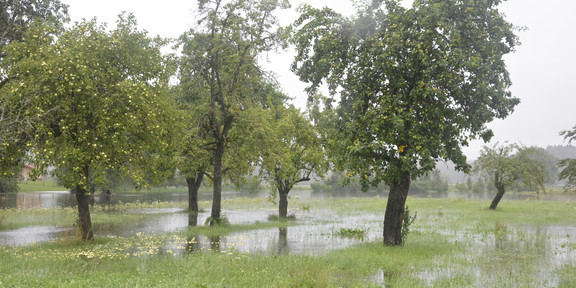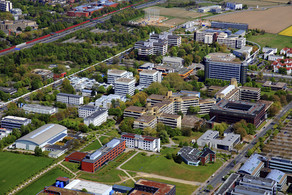LAND4CLIMATE pursues a climate-resilient Europe
- TU News

The new project LAND4CLIMATE is studying how Europe can systematically become more climate-resilient with the help of nature-based solutions. With an international consortium, led by TU Dortmund University, the project aims at activating private land for climate adaptation measures to reducing climate risks. The county of Euskirchen serves as a German frontrunner in the Project. The project will be funded by the EU with € 13 million as of September 2023, with a kick-off meeting scheduled for September.
How can built-up and agricultural land be adapted and used so that they protect neighboring properties and buildings from natural disasters? This is the research question guiding the consortium’s work in this new project at the department of Spatial Planning. An example of such a natural solution would be converting a field near a river into a retention area to provide better protection against flooding.
“In continental Europe, landscapes and cities are particularly vulnerable to climate risks because temperatures fluctuate drastically throughout the year,” says Prof. Stefan Greiving from the Department of Spatial Planning, who is heading the project alongside his colleague Prof. Thomas Hartmann. Climate change is increasing the risk of floods, droughts, forest fires, loss of biodiversity, and land degradation due to erosion. Although nature-based solutions can counteract these risks, they are not widely implemented in Europe. “One of the reasons for this is that many of the sealed surfaces that bear potential for nature-based solutions are privately owned. Private owners often don’t have an incentive to adopt their properties”, Prof. Thomas Hartmann explains.
LAND4CLIMATE aims to address this issue. The project is allocated at the Department of Spatial Planning of TU Dortmund University. Therefore, LAND4FLOOD is addressing and involving private landowners, local and regional authorities, and communities that benefit from nature-based solutions. The project aims to apply and evaluate land policy measures and business models that could motivate and enable private owners and stakeholders to implement measures. It also gives insights in which areas can still be used for development and which need to remain open in order to maximize the effect of nature-based solutions against climate risks. This entails close collaboration with authorities to implement more of these resilience-promoting measures on private land. These measures thereby shall be realized in a systematic, efficient, legitimate and just way in landscapes and urban areas of continental Europe.
International research at the regional level
LAND4CLIMATE is managed by the Department of Spatial Planning at TU Dortmund University. The project is led together by Prof. Stefan Greiving, Head of the Institute for Spatial Planning (IRPUD) and Prof. Thomas Hartmann, chair for land policy and land management. TU Dortmund University is working together with 16 partners from six European countries. In addition to TU Dortmund University, other academic partners include RWTH Aachen, Jan Evangelista Purkyně University in Ústí nad Labem (Czech Republic), the University of Natural Resources and Applied Life Sciences, Vienna (Austria), the Technical University of Košice (Slovakia), the University of Bologna (Italy), and Politehnica University Timisoara (Romania). The cooperation partners are based in the following areas: the Euskirchen district in Germany, the Bohemian Switzerland National Park in the Czech Republic, the Lafnitz river basin in Austria, the Košice region of Slovakia, the eastern Emilia region of Italy, and the Timiș river basin in Romania.
Contact person for further inquiries:



